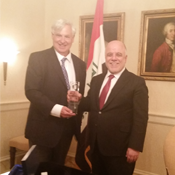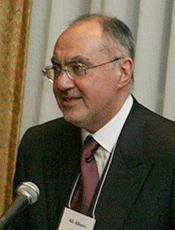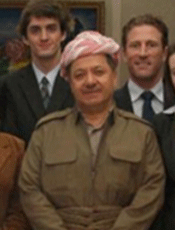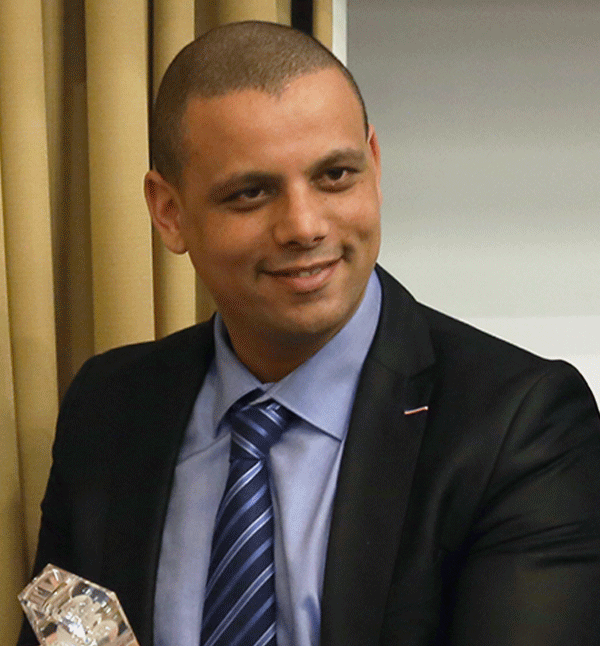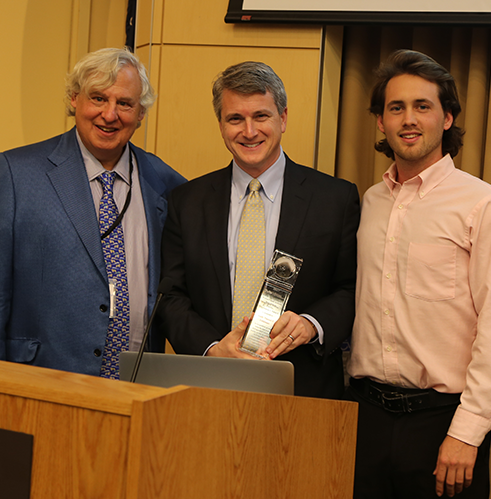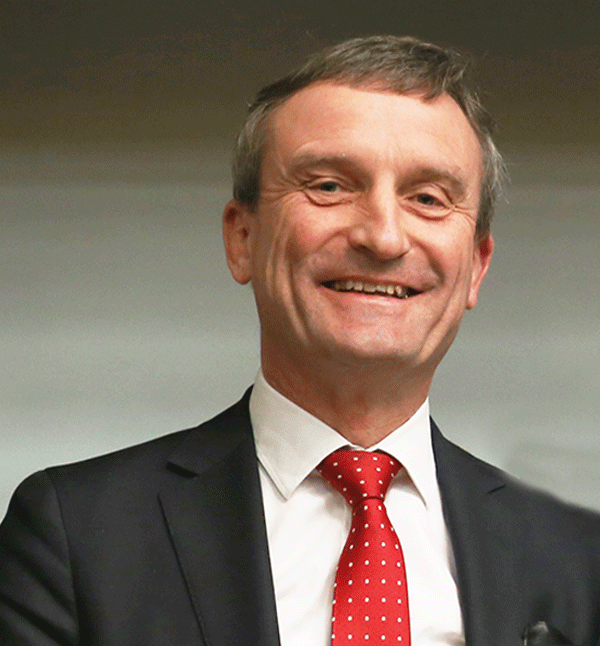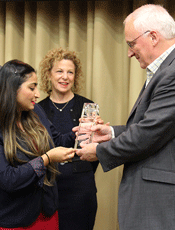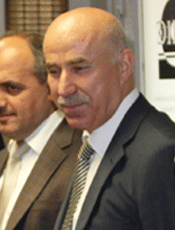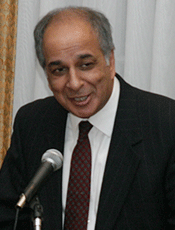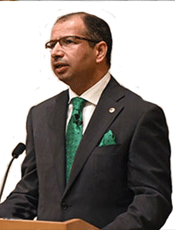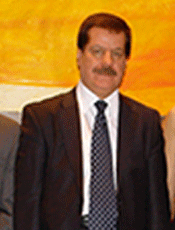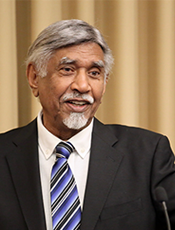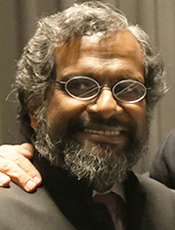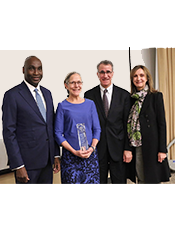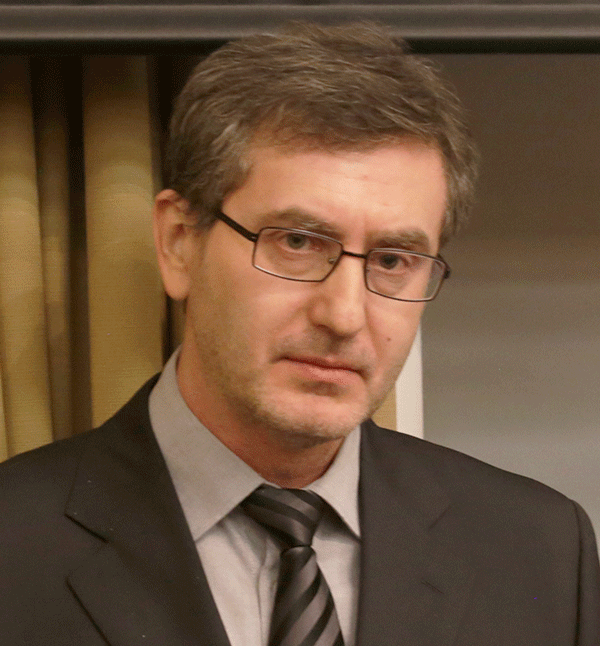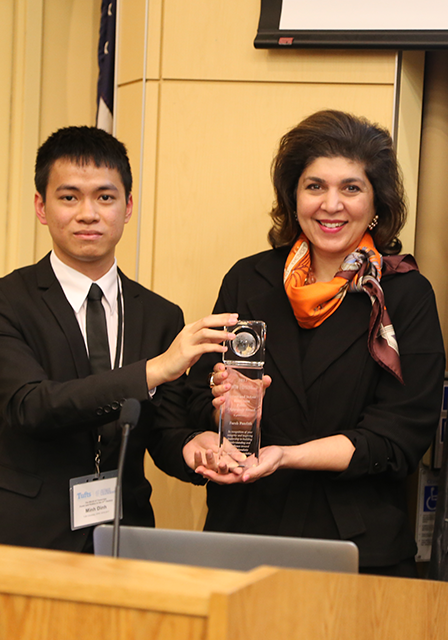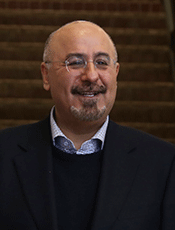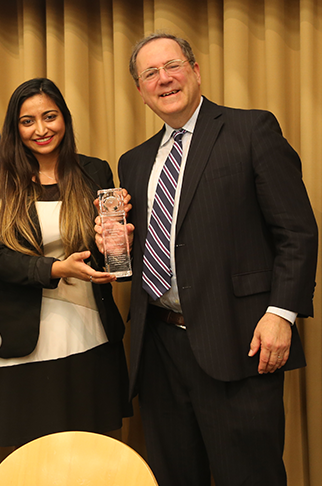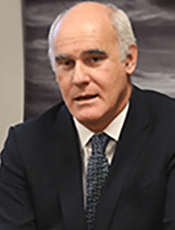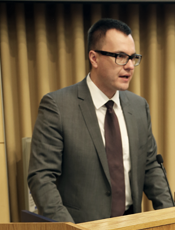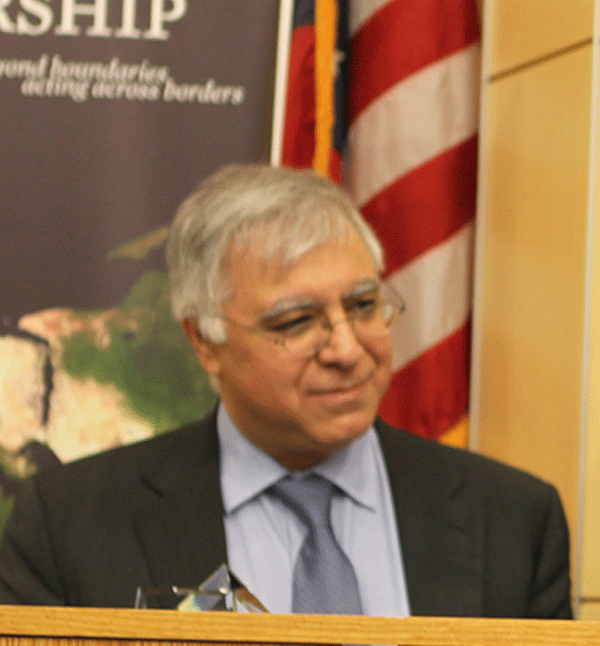The Robert and Joann Bendetson Public Diplomacy Award Recipients
|
|
Haider Jawad Kadhim Al-Abadi (2017) Haider Jawad Kadhim Al-Abadi is the 75th Prime Minister of Iraq and one of the senior politicians of the country. He succeeded Nouri al-Maliki, after being nominated by President Faud Masum as the next Prime Minister and getting approval by the government of Iraq. Haider al-Abadi came back to Iraq from exile in 2003 and thereafter held many important positions in the post-Saddam Hussein government. He served as the ‘Deputy Speaker’ before becoming the Prime Minister of Iraq. At present, he is the leader of the Islamic Dawa Party. One of the challenges of his government is to counter political corruption. As Prime Minister, he has to combat terrorism and get back the sizable portion of northern Iraq, which has been occupied by the Islamic State militants. Al-Abadi joined the Dawa Party in 1967. In 1983, the government confiscated al-Abadi's passport for conspiring against Iraq's Ba'ath Party. Al-Abadi remained in the UK, in voluntary exile, until the 2003 invasion of Iraq. In 2003, Al-Abadi became skeptical of the Coalition Provisional Authority (CPA) privatization plan, proposing to Paul Bremer that they had to wait for a legitimate government to be formed. In October 2003, Al-Abadi with all 25 of the interim Governing Council ministers protested to Paul Bremer and rejected the CPA's demand to privatize the state-owned companies and infrastructure prior to forming a legitimate government. Al-Abadi was elected as a member of the Iraqi Parliament in the December 2005 parliamentary election and chaired the parliamentary committee for Economy, Investment and Reconstruction. In 2008, Al-Abadi remained steadfast in his support of Iraqi sovereignty, insisting on specific conditions to the agreement with the US regarding its presence in Iraq. Since assuming office in September 2014, Abadi has made determined efforts to increase Sunni participation in the Iraqi government. In mid-December 2014, Abadi forged a new revenue-sharing agreement with the Kurds. Foreign Affairs magazine had written that after four months in power, Abadi's attempts to resolve Iraq's sectariåan strife make his premiership "a welcome change from the schismatic style of his predecessor". |
|
|
Ali Allawi (2008) In April 2004, Dr. Ali Allawi was appointed to be Iraq’s first post-war civilian Minister of Defence. In January 2005, he was elected to Iraq’s Transitional National Assembly as a member of the United Iraqi Alliance. In April 2005, he was appointed to be the Minister of Finance in the Transitional Government headed by Dr. Ibrahim al-Jaffari. He held that post until May 2006 when he returned to private life. In June 2007, he appeared as an expert witness and gave detailed testimony to the Iraq Commission headed by Lord Paddy Ashdown. In February 2007, the London newspaper, the Independent, devoted its full front page in presenting his plans for a comprehensive settlement for Iraq. Prior to the U.S. overthrow of Saddam Hussein, he was a Visiting Fellow at the International Institute for Islamic Thought and Civilisation (ISTAC) in Kuala Lumpur, Malaysia and a Senior Associate Member at St. Antony’s College, Oxford University, at its Centre for Middle Eastern Studies where he completed a book on the political memoirs of an Iraqi public figure. Earlier, he joined the Young Professionals Program of the World Bank Group in Washington in 1971, where he spent a number of years as an investment officer in the Capital Markets Department of the World Bank/IFC Group. Following a period as a consultant to the Arab Fund in Kuwait, he co-founded, in 1978, Arab International Finance, a merchant bank, in London.
|
|
|
President Masoud Barzani (2009) Masoud Barzani was elected President of the Kurdistan Region in Iraq by the Kurdistan National Assembly in June 2005. With the overthrow of the Iraqi monarchy in 1958, the new Republic of General Abdulkarim Qasim welcomed Mustafa Barzani, Masoud’s father, and his followers back to Iraq from a 12-year exile. Masoud Barzani was 12 years old when he was finally reunited with his father. Soon afterwards the Iraqi government resumed its repression against the people of Kurdistan. With no alternative, in 1961 the KDP, under the leadership of Mustafa Barzani, launched an armed struggle to defend the rights of the people of the Region. At the age of 16, Masoud Barzani sacrificed his education and joined the Peshmerga forces. President Barzani’s experiences in the mountains of Kurdistan were to provide him with the skills that were to later propel him to the leadership of Kurdistan’s movement. He was part of the KDP delegation that signed an autonomy agreement with Baghdad in March 1970. When the Iraqi government once again reneged on its pledges, the Kurdistan armed struggle resumed. After the death of Mustafa Barzani in March 1979, Masoud was elected as the new president of the KDP at the party’s 9th congress. Since then, he has been re-elected as the KDP’s President in each successive congress. His book, Mustafa Barzani and the Kurdish Liberation Movement, was published in Arabic in three volumes. The first volume is available in English and Turkish.
|
|
|
Fouad Ben Ahmed (2016) Fouad Ben Ahmed, a resident of the Paris banlieues, is a liaison between residents, especially youth, and the local government in Département 93, Bondy, Paris. When the massacre happened at the offices of the satirical magazine Charlie Hebdo, Ben Ahmed wrote on his Facebook page, “My French heart bleeds, my Muslim soul weeps.” It started a dialogue and was an outlet for many to discuss the challenges about being a French Muslim in France. He was then featured in The New Yorker article, “Life in the Paris Banlieues,” by George Packer.
|
|
|
Amb. Daniel Feldman (2017) Amb. Daniel Feldman joined Akin Gump Strauss Hauer & Feld LLP after most recently serving as the special representative for Afghanistan and Pakistan (SRAP) at the U.S. Department of State. Amb. Feldman had been the highest ranking official at the State Department responsible for relations with those two countries, actively shaping the Obama Administration’s policies for the region, including on political transition, economic growth initiatives, regional integration efforts, international engagement with key partners, strategic communications and congressional outreach. At the State Department, Amb. Feldman served as a principal advisor to Secretaries of State John Kerry and Hillary Rodham Clinton regarding Afghanistan, Pakistan and broader South, Central and East Asian issues. Serving in the SRAP office since its creation in 2009, originally as deputy to Amb. Richard Holbrooke, he traveled frequently to the region with both secretaries as well as a range of other senior U.S. officials from throughout the interagency community. As special representative in 2014-2015, he was the key diplomatic strategist for policy formulation and implementation, including the successful mediation of the Afghan presidential electoral impasse. For more than six years, he oversaw all economic growth initiatives in Afghanistan and Pakistan, including the promotion of private-sector investment, regional trade efforts and the appropriation of billions of dollars of U.S. foreign assistance. Feldman also created and managed the International Contact Group, a group of more than 50 countries most engaged in Afghanistan, and engaged frequently with key countries in the region, including India, China and Gulf countries, as well as European partners. For his service, Feldman was awarded two of the State Department’s highest awards, the Secretary’s Distinguished Service Award by Secretary Kerry in 2015, and the Secretary’s Distinguished Honor Award by Secretary Clinton in 2013. Beginning in 2002, Feldman was in private practice in the Washington, D.C., office of another law firm, where he co-chaired the first-of-its-kind, stand-alone CSR practice. He left that firm as a partner in 2009, when he was recruited by Amb. Richard Holbrooke to create and lead the 100-person SRAP office. He has a long history of government service and political involvement. His previous government experience includes serving as director of multilateral and humanitarian affairs at the National Security Council in the Clinton administration and as counsel and communications adviser to the U.S. Senate Homeland Security and Governmental Affairs Committee. He also was senior foreign policy and national security advisor to the Kerry presidential campaign in 2004, communications advisor and recount attorney for the Gore campaign in 2000 and a senior campaign advisor to Sen. Mark Warner. He helped to found, and subsequently served on the board of, the National Security Network, a nonprofit foreign policy organization headquartered in Washington, D.C., that focuses on international relations, global affairs and national security. He is a life member of the Council on Foreign Relations and has appeared frequently in the media, on outlets including BBC, NPR, CNN and FOX News Channel, discussing national security issues. He has been appointed a White House Fellow and a Henry Luce Scholar, and was a law clerk on the U.S. Court of Appeals for the 9th Circuit and on the South African Supreme (Constitutional) Court. Feldman is an alumnus of the EPIIC program.
|
|
|
Mayor Thomas Geisel (2016) Thomas Geisel was elected Mayor of Düsseldorf in June 2014. A lawyer by education, Mr. Geisel worked in the energy sector for most of his life: in various positions for Enron (London), Ruhrgas A.G. and E.ON Ruhrgas A.G. where he was Director for Gas Procurement. Mr. Geisel became the first social democratic mayor after 15 years of conservative rule. His father was the vice-president of the Baden-Württemberg parliament, and he joined the SPD when he was eighteen. He worked as a consultant in the first freely-elected East German parliament of the GDR and was personal assistant to the SPD party executive in Berlin.
|
|
|
Nik Gowing (2016) Nik Gowing, Visiting Professor at King’s College, Department of War Studies and Nanyang Technological University Singapore, presents new research on why the top levels in government and corporations fail to anticipate and then manage crises. Using evidence from 2,000 pages of transcripts from several hundred interviews BEFORE the Brexit vote and the political impact of Trump, Nik Gowing reveals why leaders struggle to identify and then adapt to the new, fast changing and ill-defined normal. Many confess privately to being unsighted and scared. The conformity which got them to the top disqualifies them from accepting the scale of new realities. And most remain in denial. The findings of Thinking the Unthinkable, (co-authored with Chris Langdon) offer somber findings for current leaders and those who aspire to succeed them. Nik Gowing has been a pioneer in predicting and identifying the new vulnerability, fragility and brittleness of institutional power in the new all-pervasive public information space. Gowing was a main news presenter for the BBC’s international 24-hour news channel BBC World News 1996-2014. He presented The Hub with Nik Gowing, BBC World Debates, Dateline London, plus location coverage of major global stories. For 18 years he worked at ITN where he was bureau chief in Rome and Warsaw, and Diplomatic Editor for Channel Four News (1988-1996).
|
|
|
Governor Nawzad Hadi (2009) Nawzad Hadi is the Governor of Erbil in Iraqi Kurdistan. He worked from 1992 to 1996 in the Central Media Office of the Democratic Party of Kurdistan as an engineer for Kurdistan radio and Kurdistan television. In 1997, he became an agent for the Ministry of Transport and Communications in Kurdistan, which he held until 2004. He started his mission as a governor in 2004.
|
|
|
Aboobaker Ismail (2008) Aboobaker Ismail was the Former Commander of Special Operations, Member of the Military High Command, and Chief of Ordnance for Umkhonto weSizwe, the armed wing of the African National Congress. For his actions in the fight against apartheid, he went before the country’s Truth and Reconciliation Commission and received amnesty. After apartheid, he was the Chief of Policy and Planning in the Department of Defence for South Africa. After leaving government service, he became the General Manager and Head of Department for Currency and Protection Services in the South African Reserve Bank.
|
|
|
H.E. Saleem al-Jubouri (2015) H.E. Dr. Saleem al-Jubouri is a highly acclaimed Sunni leader, who has served as a member of Iraqi Parliament since 2005. He earned his PhD, with distinction, in law in 2001 and has taught as a law Professor at AL-Nahrain University in Baghdad. He served as a member of the constitution drafting committee. He has also chaired the parliament’s Human Rights Committee. Two of his brothers were killed in a terrorist attack in 2007. In March 2014 he was targeted by a roadside bomb which killed two of his bodyguards. These attacks on his family and himself have not deterred him from serving Iraq and its people as illustrated by his election to serve as the Speaker of Iraqi Parliament in 2014.
|
|
|
Speaker Kemal Kerkuki (2009) Dr. Kemal Kerkuki is Speaker of the Kurdistan Parliament in Iraq. Known as Dr. Kemal Kerkuki in recognition of his struggle for freedom and democracy, and his service and fearless opposition to the Baath dictatorship in Iraq, born in Kerkuk 1954. During his early years, he was a member of the Union of Students of Kurdistan in Kerkuk, a prohibited organization under the Iraqi regime, and he was jailed for his participation. Qaser Al Nihaya Prison was a famous prison for aggressive torturing measures in Baghdad during the seventies. Dr. Kerkuki was released from prison in a prisoner exchange between the Kurdistan Democratic Party and the regime of the Baath Party. He left undergraduate study at medical school and volunteered for political and revolutionary work in the mountains of Iraqi Kurdistan. During this period, he was responsible, politically and militarily, for Herim II-second region of Kurdistan. Dr. Kerkuki was wounded badly twice during his struggle against the dictatorship, and was sent to Europe for treatment. After that, he returned to a political career. Dr. Kerkuki was elected as a member of the central bureau at the ninth, tenth, eleventh, twelfth, and thirteen congresses. He worked as a special representative of President Masoud Barzani in Paris, and later was responsible for branch seven of the KDP in the US and Canada, and then responsible for branch six of the KDP in Europe and Australia. He returned to Kurdistan before Iraq’s liberation as the head of the Peshmerga forces in Kirkuk. Dr. Kerkuki was a special representative of President Masoud Barzani in Kirkuk and the liaison with the Multi-National Forces in the province. In addition to that, he was a member of the first free provincial council of Kirkuk and remained as such until his election as a member of the Kurdistan Parliament, and then deputy Speaker of Parliament in 2005. In 2009, he was elected as the Speaker of Kurdistan Parliament.
|
|
|
Mac Maharaj (2017) Mac Maharaj was a member of Nelson Mandela’s inner circle during the days of resistance in South Africa. In 1977, after spending 12 years in prison on Robben Island, he was appointed secretary of the Internal Political and Reconstruction Department of the ANC. He served on the Revolutionary Council and National Executive Committee of the ANC, an underground program of armed resistance against the apartheid government. After Nelson Mandela was released from prison in 1990, Maharaj was a lead negotiator for the ANC in talks with the National Party government and Joint Secretary of the Transitional Executive Council, overseeing South Africa’s transition to democracy. Mandela appointed Maharaj minister of transport upon becoming president in 1994; Maharaj served in parliament until 1999. Recently, he was also the official spokesperson for South African President Jacob Zuma. “...[H]e dedicated his whole life to freeing us from the oppression of apartheid and to teaching our country to be inclusive so that the unity of our diversity is a cause for celebration, not conflict...In pursuit of the struggle he regarded his own life as a disposable commodity, yet throughout all he maintained his wholeness of self. His humanity was immune to the evil that tried to destroy him.” -Nelson Mandela from Shades of Difference: Mac Maharaj and the Struggle for South Africa
|
|
|
George Mathew/Music for Life International (2016) Singaporean-born Indian conductor, George Mathew, founder and Artistic Director of Music for Life International and Ubuntu-Shruti Orchestra, is one of the leading forces in the classical music world bringing symphonic music to focus on global humanitarian issues and crises. In recent seasons, he has made appearances in the US, India, Panama, Morocco, and South Africa as conductor and ambassador for transformative action through music. Shostakovich for the Children of Syria is Mr. Mathew’s fifth global humanitarian concert at Carnegie Hall since 2006, when he made his Carnegie Hall debut as Artistic Director and Conductor of Beethoven’s Ninth for South Asia. He also appeared at Carnegie, leading the Requiem for Darfur in 2007 and Mahler for the Children of AIDS in 2009. Mr. Mathew returned to Carnegie Hall in January 2011, as Artistic Director and Conductor of Beethoven for the Indus Valley. The concerts have brought together global leaders from the musical, philanthropic, business, academic, governmental and diplomatic communities and distinguished musicians from major international orchestras and other ensembles including the New York Philharmonic, Berlin Philharmonic, MET Orchestra, Cleveland Orchestra, The Philadelphia Orchestra, Boston Symphony, Minnesota Orchestra, Brooklyn Philharmonic, St. Louis Symphony, San Francisco Symphony and other orchestras as well as artists from the Emerson, Mendelssohn, American, Guarneri String Quartets, the Metropolitan Opera and many others. In March 2010, George Mathew spoke at the United Nations Development Program’s ‘Capacity IS Development’ Global Event in Marrakech, Morocco, presenting the orchestral paradigm as a new leadership model for developing institutions and capacity in the twenty-first century. From 2010 to 2012, Mr. Mathew served as Artistic Director and Conductor of the New Year’s Eve Concert for Peace at the Cathedral of St. John the Divine in New York City. This historic concert, held annually in the largest Cathedral in North America, was founded in 1985 by Leonard Bernstein.
|
|
|
Ambassador Jonathan Moore Ambassador Moore worked in government, politics, academia and the United Nations for more than 40 years. He served as U.S. Coordinator for Refugees and Ambassador-at-Large and as Director of the Refugee Programs Bureau in the U.S. Department of State, and as a U.S. Ambassador to the United Nations. Previously, he was Director of the Institute of Politics and Lecturer in Public Policy at the Kennedy School of Government, Harvard University, for twelve years. Amb. Moore was on the Institute’s External Advisory Board since its inception and is a recipient of the Dr. Jean Mayer Global Citizenship Award. In Moore's talk "Infusing a Moral Imagination in U.S. Policies" he explains "The cumulative impact of these is foreboding, but the biggest [gap] of all is the “rich/poor” gap — the earth’s fundamental moral inequity and dysfunction, which is widening and affects everything else. There are a number of huge, converging forces in our globalizing world, which radically threaten our interests and challenge our ability to survive."
|
|
|
Hasan Nuhanović (2016) Hasan Nuhanović is a survivor of the Srebrenica genocide during the Bosnia War. In 1992, Hasan Nuhanović and his family fled the violence in their hometown of Vlasenica, landing in Srebrenica (what became one of the UN designated safe havens). The United Nations peacekeepers arrived in Srebrenica in 1993, and Nuhanović found a job with them as a translator. When the Bosnian Serb army attacked Srebrenica in 1995, Nuhanović and his family sought shelter at the UN base, Potocari, with some 30,000 other civilians. On July 13, 1995, after the peacekeepers negotiated with Gen. Ratko Mladic (with Nuhanovic translating), the Dutch commander ordered the refugees to leave. Nuhanović was allowed to stay on the base because of his job. Despite Nuhanovic’s pleas, his parents and brother were forced off the UN base. All three were among the 8,000 Bosniaks killed by the Serbs. Since the end of the Bosnian war, Nuhanović has campaigned to establish and publicize the truth about the genocide. He has given evidence at the International Criminal Tribunal for the Former Yugoslavia at The Hague. He played an important part in establishing the Srebrenica Genocide Memorial at Potočari where the remains of many of the identified victims have been interred. He works closely with other survivors and relatives’ organizations, including the Mothers of Srebrenica in Sarajevo and the Women of Srebrenica in Tuzla. Hasan became an active campaigner for truth and justice on behalf of other survivors and relatives of the victims. In 2002, he brought a legal case, in the Netherlands, for compensation which came to a conclusion in 2013, when the Dutch supreme court said the Dutch state could be held responsible for the deaths. He has written a chronology of the events at Srebrenica, Under the UN Flag, in which he examines the responsibility and guilt of members of the international community who were either direct participants on the ground or indirectly influenced or were capable of influencing those events but failed to fulfill their commitment to protect the Muslim population of the besieged “safe area”. Bosnian investigative journalist Dragan Stanimirović nicknamed him the “Elie Wiesel of Bosnia”, in a reference to another activist survivor of genocide.
|
|
|
Farah Pandith (2017) Farah Pandith is a diplomatic entrepreneur, foreign policy strategist and former diplomat. Pandith has been a political appointee in the George H.W. Bush, George W. Bush and Barack H. Obama administrations. She left government in early 2014 for Harvard University’s Kennedy School of Government where she maintains an affiliation. In 2015, Pandith was appointed to Secretary of Homeland Security Jeh Johnson’s Homeland Security Advisory Council (HSAC) where she also chairs the HSAC subcommittee on countering violent extremism (CVE). She is a Senior Advisor and Commissioner on a CSIS CVE Commission to be released in late 2016. She is writing a book on extremism and driving efforts to counter extremism through new organizations, programs, and initiatives. She was appointed the first-ever special representative to Muslim Communities in June 2009 by Secretary of State Hillary Rodham Clinton, serving under both Secretaries Clinton and John Kerry. The Office of the Special Representative was responsible for executing a vision for engagement with Muslims around the world based on a people-to-people and organizational level. She reported directly to the secretary of state. Pandith traveled to nearly one hundred countries and launched youth-focused initiatives. She is also the main architect of the Women in Public Service Project. In January 2013, she was awarded the Secretary’s Distinguished Honor Award. Prior to this appointment, Pandith was senior advisor to the assistant secretary of state for European and Eurasian Affairs. This role was created for her in the context of the Danish Cartoon Crisis, and she built new State Department strategies for how U.S. embassies in Europe understood the Muslim demographic, the increase in foreign ideologies present on the ground, and how the United States could build resilience. From December 2004 to February 2007, Pandith served as the director for Middle East Regional Initiatives for the National Security Council. Prior to joining the NSC, Pandith was chief of staff of the Bureau for Asia and the Near East for the U.S. Agency for International Development (USAID). In 2004, she spent two months in Afghanistan developing a public outreach strategy. She also served at USAID from 1990–1993 on the administrator’s staff and as the special assistant to the director of policy. From 1997 to 2003, Pandith was Vice President of International Business for ML Strategies, LLC in Boston, Massachusetts, and served as a Commissioner on Governor Paul A. Cellucci’s bi- partisan Asian Advisory Commission.
|
|
|
Mohammad Sabah Al-Salem Al-Sabah (2014) Mohammad Sabah Al-Salem Al-Sabah is the Former Deputy Prime Minister and Minister of Foreign Affairs for Kuwait. He is the Chairman of the Board of Directors of the Sabah Al-Salem Al-Sabah Foundation and the former Chairman of the Board of Directors of the Kuwaiti Fund for Arab Economic Development. He has held the position of Ambassador of the State of Kuwait to the United States of America as well as Member of the Kuwaiti delegation to North America that was selected by the “Popular Congress” during the Iraqi Occupation of Kuwait. He currently is a Member of the Leadership Council of the UN Sustainable Development Solutions Network, a Senior Advisor to Earth Institute at Columbia University, a Member of the Board of Trustees for the Council for Arab and International Relations, and a Founding Member and Board of Trustees Member of the Kuwait–America Foundation.
|
|
|
David Sanger (2017) David Sanger is a national security correspondent for The New York Times and one of the newspaper’s senior writers, as well as an Adjunct Lecturer in Public Policy at the Kennedy School of Government at Harvard University. He is also the bestselling author of “Confront and Conceal: Obama's Secret Wars and Surprising Use of American Power,” and “The Inheritance: The World Obama Confronts and the Challenges to American Power.” He has been a member of two teams that won the Pulitzer Prize and has received numerous awards for coverage of the presidency and national security policy. He also teaches national security policy at Harvard’s Kennedy School of Government. From 1999 until 2006, Sanger was White House correspondent for The New York Times covering one of the most tumultuous eras in American national security policy, from 9/11 through the wars in Afghanistan and Iraq. He has also won the Weintal Prize for diplomatic reporting for his coverage of the Iraq and Korea crises, the Aldo Beckman prize for coverage of the Presidency, and, in two separate years, the Merriman Smith Memorial Award, for coverage of national security issues. Sanger has specialized in coverage of nuclear proliferation. “Nuclear Jihad,” the documentary that Sanger reported for Discovery/Times Television, won the 2007 DuPont Award for its explanation of the workings of the A.Q. Khan nuclear proliferation network. The documentary was based on a series of investigative articles that Sanger co-authored with William Broad; that series was a finalist for the Pulitzer Prize. Sanger has reported from New York, Washington and Tokyo, where he was bureau chief in the early 1990’s. He returned to Washington in 1994 as chief economic correspondent. In all of those roles, he has covered a wide variety of issues surrounding foreign policy, globalization, nuclear proliferation and Asian affairs, and was appointed chief Washington correspondent in 2006.
|
|
|
Amb. João Vale de Almeida (2016) Prior to his appointment in Washington as the European Union’s Ambassador, Amb. João Vale de Almeida served as the Director General for External Relations at the European Commission, the European Union’s executive body. As the most senior official under the authority of the High Representative/Vice-President Baroness Ashton, he helped formulate and execute the EU’s foreign policy and played a key role in preparing for the new European External Action Service (EEAS) introduced by the Treaty of Lisbon. From 2004 to 2009, Amb. Vale de Almeida was the Head of Cabinet (Chief of staff and main adviser) for European Commission President José Manuel Barroso. He accompanied President Barroso in all European Council (EU Summit) meetings and ensured coordination with the private offices of Heads of State and Governments in all 28 Member States of the EU. Amb. Vale de Almeida was also the President’s Personal Representative for the negotiations on the Treaty of Lisbon. He also acted as the EU “Sherpa” for G8 and G20 Summits. In this capacity he attended annual G8 Summits in Gleneagles, UK; St Petersburg, RU; Heiligendamm, DE; Toyako-Hokkaido, JP; L’Aquila, IT; and Muskoka, CA between 2005 and 2010. He also attended Summit meetings with the EU’s strategic partners around the world. Earlier in his career in the European institutions, Amb. Vale de Almeida held several senior positions in the European Commission and the Economic and Social Committee and worked closely in different capacities with and under the authority of former Commission Presidents Jacques Delors, Jacques Santer and Romano Prodi. Immediately before joining President Barroso’s team in 2004, Amb. Vale de Almeida held a senior position in the Directorate General for Education and Culture after serving as Deputy Chief Spokesman of the European Commission. Amb. Vale de Almeida was decorated by the President of the Republic of Portugal with the ‘Grã-Cruz da Ordem do Infante D. Henrique’ (Grand Cross of the Order of the Infante D. Henrique) in 2011.
|
|
|
Feodor Voytolovsky (2018) Feodor Voytolovsky is the Director of the Primakov Institute of World Economy and International Relations of the Russian Academy of Sciences (IME-MO), Moscow. He is also a Professor of Political Science at MGIMO University, and Editorial Board member of the journal World Economy and International Relations, and an Editorial Board member of IMEMO's Global Development almanac. He is the author of IMEMO's Strategic Global Forecast - 2030. He received the First Prize Medal for the next generation of reserchers for his monograph Unity and Division of the West from the Russian Academy of Sciences. His research interests are mainly focused on US foreign and security policy, transatlantic relations, US foreign and security policy in Asia Pacific, US-Russia and US-China relations. Dr. Voytolovsky has participated in several track II initiatives on international security including the military-political group of EASI (2009-2012) and Boisto group (2014).
|
|
|
Ambassador Fareed Yasseen (2016) Amb Fareed Yasseen has been the Ambassador of Iraq to France since 2010. Educated in Iraq, Switzerland and the United States, he was a trained physicist before entering politics. Having gotten involved in political activism and human rights advocacy, he has worked and consulted for various UN agencies and think tanks. He is the former Head of Policy Planning in the Iraqi Ministry of Foreign Affairs and the former Diplomatic Adviser to Deputy President Adil Abd al-Mahdi. |

